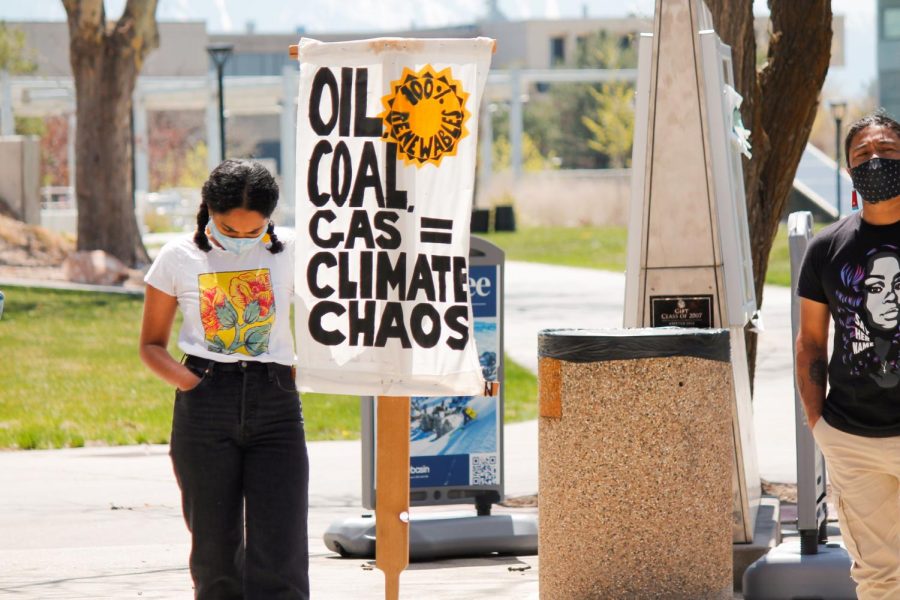Buening: The Supreme Court Crusades Against Environmental Protection
Zahra Saifee holds a sign at a climate protest held by Divest U at the Union Plaza on April 22, 2021. (Photo by Natalie Colby | The Daily Utah Chronicle)
July 17, 2022
In the final days of the Supreme Court’s nine-month session, conservative justices have managed to eviscerate not only reproductive rights and fourth amendment freedoms, but also environmental authority. What a great time to be an American.
Meanwhile, a trend of environmental apathy persists. The most recent global climate conference did little to defend against climate change or any other calamity. A NASA scientist and three others were arrested during a climate protest for engaging in civil disobedience. And in April, a climate activist martyred himself via self-immolation in front of the Supreme Court. Still, it didn’t capture more than a blip of headline attention.
What does it say about our nation that this death, and these disasters, mean nothing to us? What does it say about the sort of actions we’d need to merit a response from an environmentally negligent government?
We’ve been begging for action and none arrives. Except for, of course, actions that directly oppose the wishes and health of our people. About 69% of U.S. adults want the country to become carbon neutral by 2050. But if SCOTUS’s decision in West Virginia v. EPA is any indication, we shouldn’t hold our breath.
Our legislative process has never operated for the benefit of the environment. Instead, we’re so busy trying to resist devolution that we can’t achieve progress on any reasonable timescale. SCOTUS’s decision in West Virginia vs EPA undermines progressive climate action and creates dangerous ramifications for Utah environments.
Significance of the Case
West Virginia v. EPA set us backward by weakening legal precedents that took activists ages to achieve. In 2007, Massachusetts v. EPA established global warming emissions as air pollutants, therefore subjecting them to EPA regulation under the Clean Air Act. Still, it took the EPA two years to satisfy Congress’ demands and prove that said pollutants endangered public health — something that science had already thoroughly established.
Once the EPA received this authority, it attempted to initiate “generation shifting” — a transition from higher- to lower-emitting energy sources. The end goal was to shift both coal and gas plants to renewables. Emission limits and cap-and-trade practices acted as the two main methods, however presidential turnovers complicated matters. A series of clean power plans were proposed and then immediately repealed during the Obama-to-Trump transition.
We play a dangerous game of one step forward, three steps back.
Despite infuriating presidential gridlock, the EPA helped us achieve a sharp decline in coal usage after 2008. Now West Virginia v. EPA removed the EPA’s ability to make power providers stop burning coal, despite power plant greenhouse gas emissions making up 25% of total U.S. emissions. And coal remains arguably the most detrimental fossil fuel in existence. Its mining alone causes deforestation, land and waterway contamination. Once it gets burned for energy, it generates destructive air pollutants like carbon monoxide and carbon dioxide. On top of that, its emissions cause acid rain and the mining industry’s deplorable working conditions.
But while SCOTUS’s decision erased previous precedent, it also created a new and dangerous one. SCOTUS majority opinion relied on “major questions doctrine,” which asserts that issues with major economic or political consequences require explicit congressional authorization in law.
Justice Neil M. Gorsuch claimed the Constitution does not authorize agencies like the EPA to use “pen-and-phone regulations as substitutes for laws passed by the people’s representatives.” It’s rather hypocritical, considering none of us voted to have Justice Gorsuch “represent” us. More worrisome, though, is that such logic allows the conservative high justices to declare when regulation is “too much” with just the sweep of a pen.
Any privileges we might have to clean air and environment seem temporary at best.
An Unwilling Government
We should be concerned about what this decision foreshadows for us. SCOTUS might pat themselves on the back for placing more regulatory power in the hands of Congress, individual states and itself, but these institutions have never cooperated in the environment’s best interest. The Supreme Court has already agreed to revisit a landmark case that challenges whether wetlands should be protected under the Clean Water Act. Red states are suing to end the Biden administration’s moratorium on oil and gas leasing on federal lands. Who’s to say what they might go after next?
No executive power will save us either. Despite spouting progressive climate plans, President Biden paved the way for further offshore oil and gas drilling the day after the court’s ruling. His campaign promised an end to federal fossil fuel leasing, something he obviously doesn’t plan to respect.
With little options left, it’s time for Utah to step up.
What it Means for Utah
Perhaps the EPA will swoop in to exercise some of their remaining authority. They can still regulate greenhouse gas emissions from new power plants and automobiles. But while our environmental security sits precariously on a political seesaw, Utah can’t sit around and wait. Especially not while the entire Western U.S. sinks deeper into a developing climate disaster.
In Utah, coal remains the primary source of electricity generation. During Trump’s presidency, coalfields encroached upon protected monuments — namely the Grand Staircase-Escalante National Monument — while overall use declined. But our progress has not been accelerated enough. Hawaii mandated a full transition to renewable energy, phasing out coal plants altogether. We have no excuse to let the Supreme Court’s negligence translate into our own.
We need an energy shift now, starting with staunchly limiting what mercury, arsenic, air pollutants and other toxic compounds we allow existing coal plants to produce. We need to recognize what the Supreme Court could not: that coal power is no longer a viable energy source. It’s time to stop traveling backwards.








